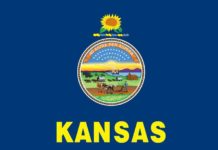Kansas prevailed at the U.S. Supreme Court on Tuesday when the justices found that federal immigration law doesn’t override the state’s prosecution of identity theft.
The U.S. Supreme Court ruled 5-4 in favor of the attorney general’s appeal of a state Supreme Court decision, which overturned three identity theft convictions because federal law pre-empted state prosecutions for using false or stolen personal information contained in federal immigration forms.
“From the beginning of our country, criminal law enforcement has been primarily a responsibility of the states, and that remains true today,” Justice Samuel Alito wrote in the majority opinion.
“Our federal system would be turned upside down if we were to hold that federal criminal law pre-empts state law whenever they overlap,” Alito wrote.
“Indeed, in the vast majority of cases where federal and state laws overlap, allowing the states to prosecute is entirely consistent with federal interests.”
Alito was joined by Chief Justice John Roberts and Justices Clarence Thomas, Brett Kavanaugh and Neil Gorsuch.
Justice Stephen Breyer filed an opinion that concurred in part but dissented in part. He was joined by Justices Elena Kagan, Ruth Bader Ginsburg and Sonia Sotomayor.
Three years ago, the Kansas Supreme Court overturned the convictions of three men – Ramiro Garcia, Donaldo Morales and Guadalupe Ochoa-Lara – who could not legally work in the United States.
The three restaurant workers were convicted of identity theft and providing false information on state tax forms or private legal documents.
In a 5-2 ruling, the state Supreme Court concluded that federal immigration law prohibited Kansas from enforcing state criminal law because the information had also been submitted on a federal I-9 form used for employment verification. All three prosecutions arose in Johnson County.
“Congress never intended to block Kansas from prosecuting people who falsify tax forms or private legal documents merely because the defendant also falsified federal employment verification forms,” Attorney General Derek Schmidt said in a statement.
“Today’s ruling makes clear that state identity theft laws apply to everybody, including offenders who are in the country unlawfully and apply for a job.”
The case will now be returned to the Kansas Supreme Court for further proceedings.
The U.S. Supreme Court majority criticized the state Supreme Court for how it arrived at its conclusion.
Federal immigration law expressly pre-empts state law but it was inapplicable in this case, the court ruled.
The Kansas Supreme Court instead used another provision of federal law, which the court said was broader in scope.
The state court relied on a section of federal law that restricted any use of the I–9 form, information contained on the I–9 form, and any documents attached to the I–9.
“Taken at face value, this theory would mean that no information placed on an I–9 — including an employee’s name, residence address, date of birth, telephone number, and e-mail address — could ever be used by any entity or person for any reason, the court wrote.
“The mere fact that an I–9 contains an item of information, such as a name or address, does not mean that information “contained in” the I–9 is used whenever that name or address is later employed.”
The court’s opinion then lectured the lower court, saying its interpretation of the federal law was “flatly contrary to standard English usage.”
Alito suggested that just because an item of information is contained in the I-9 form doesn’t preclude it from being used if the information is found elsewhere.
The court highlighted the use of someone’s e-mail address, which is on the I-9 form but can be found in many places.
“Individuals often provide their e-mail addresses to a wide circle of friends, acquaintances, online vendors, work-related contacts, and others,” Alito wrote.
“In ordinary speech, no one would say that a person who uses an e-mail address has used information that is contained in all these places,” he wrote.
He also used a student’s report on the first lunar walk to illustrate how the Kansas Supreme Court came to the incorrect decision.
Alito pointed out how Neil Armstrong’s first steps on the moon were reported around the world from the astronaut’s hometown newspaper in Wapakoneta, Ohio to the Soviet newspaper, Izvestia.
“Suppose that an elementary school student writes a report in which she states that the first man walked on the moon in 1969,” Alito wrote.
“No one would say that the student used information contained in the Wapakoneta Daily News or Izvestia if she never saw those publications.
“But it would be natural to say that the student used information contained in a book in the school library if that is where she got the information for her report.”
The National Immigration Law Center and the Southern Poverty Law Center had filed a friend-of-the-court brief on behalf Garcia, Morales and Ochoa-Lara.
They argued against the state playing any role in enforcing employment eligibility.
“Permitting a state role in the enforcement of employment eligibility would diminish trust between local law enforcement actors and immigrant workers, hindering community law enforcement efforts as well as prosecutions of serious crimes such as human trafficking,” they argued in their brief.
“Allowing states to engage in such prosecutions will chill workplace rights, and erode workplace standards for all workers.”















